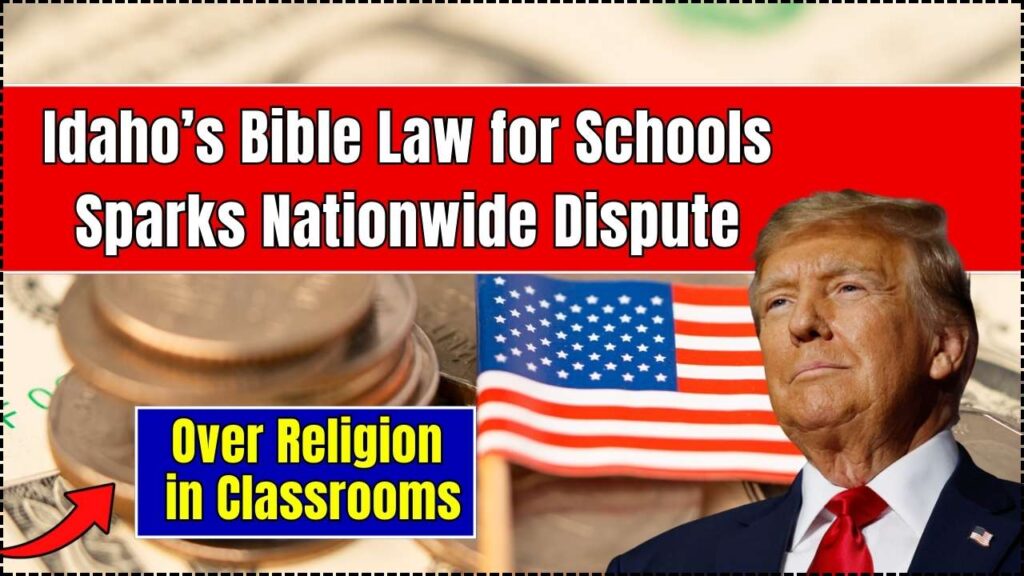
Idaho’s Bible Law for Schools Sparks Nationwide Dispute Over Religion: The Idaho Bible Law for Schools is making headlines as it stirs a heated national debate over the role of religion in public education. A new legislative proposal aims to mandate daily Bible readings in public school classrooms, drawing concerns over the separation of church and state. Supporters argue that biblical literacy is crucial to understanding Western civilization, while opponents warn of potential constitutional violations.
This article explores the history, legal concerns, national reactions, and potential impact of this law, helping you understand why it has become such a contentious issue.
Idaho’s Bible Law for Schools Sparks Nationwide Dispute Over Religion
| Topic | Details |
|---|---|
| Proposed Law | Requires daily Bible readings in Idaho public schools. |
| Supporters’ Argument | The Bible is a foundational text for understanding Western culture. |
| Opposition Concerns | Violates the Establishment Clause and Idaho’s own constitution. |
| National Trends | Similar laws are being proposed in Texas, Oklahoma, and Louisiana. |
| Potential Legal Impact | Expected court challenges based on Supreme Court precedents. |
| More Information | Idaho State Legislature |
Idaho’s proposed Bible Law for Schools has ignited a fierce debate about religion in public education. While supporters argue that biblical literacy is essential, opponents warn of constitutional violations and legal battles.
With national trends showing similar religious education mandates, Idaho’s decision could set a legal precedent for future cases. Whether this bill passes or fails, it is a key moment in the ongoing church-state debate in America.
Idaho’s Bible Law for Schools
What Does the Law Propose?
The bill, introduced by Republican lawmakers, would require public schools to conduct daily readings from the Bible. It does not specify which passages should be read or how teachers should interpret them. The bill’s authors argue that the Bible is essential for cultural literacy and historical context in subjects like literature, history, and law.
However, critics argue that this mandate crosses the line between education and religious indoctrination, sparking legal and ethical concerns.
Historical Context: Religion in Schools
Idaho has historical precedent for Bible readings in schools. In 1925, a law required daily Bible readings, but it was overturned in 1964 when a federal court ruled it unconstitutional.
- The Engel v. Vitale (1962) ruling declared school-sponsored prayer unconstitutional.
- The Abington School District v. Schempp (1963) case struck down mandatory Bible readings in public schools.
What Idaho’s Constitution Says
Idaho’s state constitution explicitly prohibits using public funds for sectarian religious purposes and bars religious instruction in public schools. This raises concerns about whether this new law would withstand legal challenges.
Arguments For and Against the Bill
Arguments in Favor
- Biblical Literacy Enhances Education
- Supporters argue that the Bible is a foundational text for literature, history, and government.
- Many classic works of literature reference biblical stories.
- Moral and Ethical Teachings
- Proponents believe the Bible offers moral guidance beneficial for young students.
- They argue that exposure to biblical teachings can instill values like honesty and kindness.
- States’ Rights to Determine Curriculum
- Supporters believe each state should decide its educational policies.
- They claim federal interference in religious matters is overreach.
Arguments Against
- Violation of the First Amendment
- The Establishment Clause prohibits government endorsement of religion.
- Mandatory Bible readings could be seen as coercing religious participation.
- Potential Legal Battles
- Lawsuits are likely, as courts have consistently ruled against mandatory religious activities in schools.
- Defending the law in court could cost taxpayers millions.
- Exclusion of Non-Christian Students
- Critics argue that the bill alienates students of different faiths.
- Public schools serve a diverse population, making government-sponsored religious activities problematic.
Social Security Deposits Up to $5,108 Arriving – Check Your Payment Date!
Your Social Security Payment Could Arrive in 48 Hours – Here’s What You Need to Know!
DOGE Impact on Social Security? Employees Issue Urgent Warning!
National Trends: Is This Happening Elsewhere?
Several other states are considering or enacting similar laws regarding religion in schools:
- Texas: The State Board of Education approved the “Bluebonnet Curriculum”, integrating biblical references into elementary education.
- Oklahoma: The state mandated every public school classroom to have a King James Bible.
- Louisiana: A law requiring the display of the Ten Commandments in classrooms was ruled unconstitutional.
These laws suggest a growing movement in certain states to reintroduce religious teachings into public education.
Potential Legal and Social Impact
Legal Ramifications
If Idaho’s bill passes, legal challenges are almost certain. The Supreme Court has consistently ruled against mandatory religious activities in schools, making it unlikely that this law would survive constitutional scrutiny.
- Past Rulings Indicate Rejection: The Supreme Court has rejected school-sponsored Bible readings, prayers, and religious activities.
- Taxpayer Burden: Court cases could cost Idaho millions in legal fees.
Social and Educational Consequences
- Divisive Classrooms: Religious mandates could divide students based on their beliefs.
- Teacher Dilemmas: Public school teachers may be forced to participate in religious activities.
- Curriculum Adjustments: If implemented, schools would need to adjust their lesson plans to comply.
FAQs
1. Is teaching the Bible in schools illegal?
No. Teaching about the Bible in a literary or historical context is legal. However, mandatory religious readings or practices violate Supreme Court rulings.
2. How does this law differ from teaching religion academically?
Academic courses analyze the Bible objectively as literature. This bill requires daily Bible readings, making it a religious exercise rather than an academic one.
3. What happens if students refuse to participate?
The bill does not clarify whether students can opt-out. If they cannot, legal challenges are likely.
4. Would this affect private schools?
No. Private schools are not bound by the same restrictions as public schools. Many already teach religion as part of their curriculum.
5. Will this law be challenged in court?
Yes. If passed, the law is expected to face lawsuits challenging its constitutionality.










